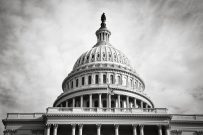Don't Run Government Like a Business. Please.
The panoply of antipolitical candidates seeking the Republican nomination and gaining varyingly intense but correspondingly fleeting degrees of traction—Donald Trump, Carly Fiorina, Ben Carson—are united in their aspiration to run government more like a business.
Trump says government can be “a business with heart.” (“What people don’t know about me, I have a lot of heart.” Oh, no. Oh, please no.) Fiorina emphasizes that she “understands executive decision-making.” Carson promises that “we”—when, by the way, did adoption of the royal “we” become mandatory for aspirants to any office?—“are going to change the government into something that looks more like a well-run business than a behemoth of inefficiency.”
It sounds seductive. But on reflection, leave the behemoth; take the inefficiency. Government is not a business. It neither can nor should be operated like one.
Presidents do need executive aptitude to lead a branch of government, and business experience might therefore commend itself to voters. But Presidents also need the capacities to share power, defer to other decision-makers and choose prudentially between occasional daring of the type business rewards and, more often, the caution warranted by the infinite complexity of the social institutions politicians lead.
Political and business judgment are consequently not the same thing. That is most clearly the case because political and business enterprises do not share the same goals. Businesses are, and ought to be, focused solely on value for the shareholders who own them. Their goals are simple to identify, if complicated to achieve. The ends of politics—whether the human ennoblement of Aristotelian thought or the mere protection of libertarianism—are far more complex.
Corporate leaders can be autocratic—even those who lead by consensus share authority by choice—precisely because their associations are voluntary: Customers opt to do business with them; employees choose jobs in their workplaces. The power of political leaders must be dispersed because it is, by its nature, coercive. A President Trump cannot flippantly fire a recalcitrant member of Congress, even one who does not get with such elements of his program as the one The Donald declared recently to NBC’s Chuck Todd: “Chuck, we have to have a country.”
Moreover, the aspiration to run government like a business partakes of efficiency as the central object of politics. This nominally conservative objective actually fuels progressive goals.
It is of a piece with the aimless, valueless “get things done” mentality that opposes gridlock without regard to whether traffic is straining in a worthy direction. The result is perhaps the most profound, consistent and nonpartisan bias in the media: the one that favors news and therefore action. Its political equivalent, Gene Healy reminds us, is the priceless syllogism from the BBC program Yes, Minister: “Something must be done, this is something, therefore we must do it.”
Efficiency is not the goal of the constitutional regime. Laws under the Constitution, like runs in baseball, are supposed to be possible but difficult, and like baseball, much of the beauty of the regime lies in the inhibition rather than the achievement of action. The system’s goal is for legitimately public business to be transacted in a deliberate, republican manner whose gradual pace assures its sobriety and protects liberty.
No management consultant worth his Wharton MBA would tolerate the redundant processes and dispersed authority that goal requires. But it is necessary, just as the logrolling an executive would dismiss as sordid and inefficient—after all, why buy someone off to do the right thing when you can order him to do it instead?—is, in a political community, a source of consensus and stability. Government acting efficiently and rationally on a corporate model is also government operating uninhibitedly.
Certainly government can learn from business, and unquestionably business leaders have a great deal to contribute to politics. An executive might well make an excellent president, perhaps even without serving an interval in political life first. But it would be because he or she displayed political judgment, prudence and respect for constitutional norms—in other words, because he or she grasped the unique virtues that political life demands.



